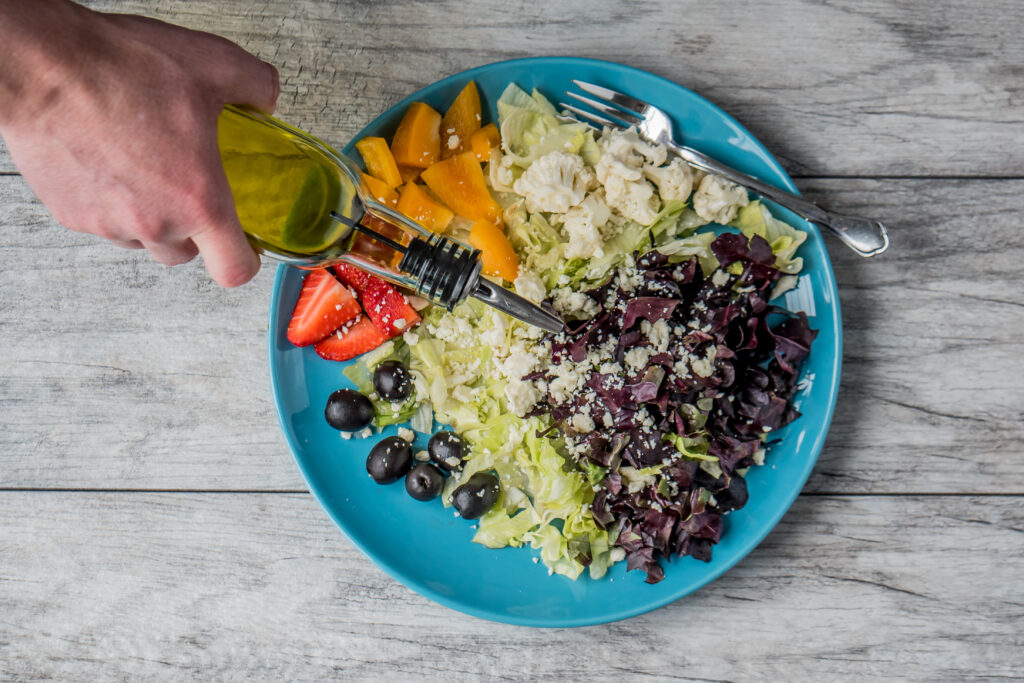All About Fats (The Good and the Bad)

By: Shaylyn Tinari, MS, RD, LDN
I’m sure by now you have heard the term “healthy fats” but what does that really mean? Let’s start with the basics. Fats do not make you fat. Any food consumed in excess can make you gain weight. Fats are a type of macronutrient. Macronutrients are the main nutrients that make up the food we eat. Everything you eat and drink falls under one of the three macronutrients: proteins, carbohydrates, and fats. Just like carbohydrates and proteins, there are healthy food sources of fats and less healthy food sources.
There are 4 types of fats: monounsaturated, polyunsaturated, saturated, and trans fat. The healthy fats are considered the unsaturated fats: monounsaturated and polyunsaturated.
It is recommended to consume 25-30% of your daily calories from fat sources. Let’s say you are eating 2,000 calories per day, 25-30% would be 55g-67g of total fat per day. The Dietary Guidelines for Americans 2015-2020 recommends consuming less than 10% of your calories per day from saturated fat. That means if you are eating 2,000 calories per day, you would want to eat less than 22g of saturated fat. Let’s break it down by type of fat.
Based on a 2,000 calorie diet, the breakdown of how much fat you want to eat in one day and what kind of fat is below.
Total fat: 55-67g
Saturated fat: <23g
*if you have heart disease or risk of heart disease, you may want to consume even less. The American Heart Association recommends 5-6% saturated fat per day which would be <14g per day.
Unsaturated fats (mono and poly): 33-45g
Trans fat: 0g
So that’s great, but how can I incorporate more healthy fats into my diet and why are some better for me than others?
Polyunsaturated fats: eating a diet that emphasizes more poly and monounsaturated fats and less saturated and trans fat can reduce your cholesterol levels and lower your risk of heart disease and stroke. Foods that contain polyunsaturated fat: oils such as soybean oil, corn oil, and sunflower oil, nuts and seeds, and tofu and soybeans.
Monounsaturated fats: eating a diet that emphasizes more poly and monounsaturated fats and less saturated and trans fat can reduce your cholesterol levels and lower your risk of heart disease and stroke. Foods that contain monounsaturated fat: oils such as olive oil, canola oil, safflower oil, sesame oil, and peanut oil, avocados, peanut butter, almond butter, cashew butter, and nuts and seeds.
Saturated fats: eating a diet high in saturated fat can increase your cholesterol and raise your risk of heart disease. Foods that contain saturated fat: fatty beef, lamb, pork, poultry with skin, lard and cream, butter, cheese, dairy products, coconut oil, fried foods, and baked goods. Evidence shows that replacing saturated fats with unsaturated fats is associated with better heart-health outcomes.
Trans fats: artificial trans fats, a modified form of vegetable oils, raise your bad cholesterol levels (LDL) and lower your good cholesterol levels (HDL). Eating any amount of trans fat can increase your risk of heart disease, stroke, and type 2 diabetes. Luckily, you should not see trans fat in any food you’re consuming in the US because it was banned in 2015. However, just to be safe, trans fat on an ingredient list is “partially hydrogenated oils.”
Some tips to get you started – easy ways to swap out saturated fats for unsaturated fats:
- Use olive oil or canola oil instead of butter
- Pair peanut butter or another nut butter instead of cheese with fruit
- Choose grilled or baked options while out to eat instead of fried or battered
- Swap coconut oil for olive oil
Having a difficult time figuring out where your fat foods are coming from or how to eat healthier fats? Contact the dietitians at Yummy Body Nutrition – we can help!
- https://www.heart.org/en/healthy-living/healthy-eating/eat-smart/fats/saturated-fats
- https://www.heart.org/en/healthy-living/healthy-eating/eat-smart/fats/polyunsaturated-fats
- https://www.heart.org/en/healthy-living/healthy-eating/eat-smart/fats/polyunsaturated-fats
- https://www.heart.org/en/healthy-living/healthy-eating/eat-smart/fats/monounsaturated-fats
- https://www.washingtonpost.com/news/wonk/wp/2018/06/18/artificial-trans-fats-widely-linked-to-heart-disease-are-officially-banned/